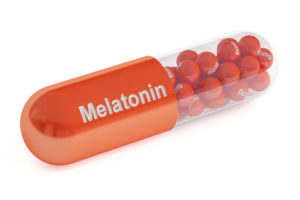
Hypertension is one of the most common age-related health problems and one that raises the risk of a number of serious health problems, including cardiovascular disease and stroke. In fact, high blood pressure can damage every organ in the human body by injuring the blood vessels that carry nutrient and oxygen to them. There’s no shortage of prescription medications that lower blood pressure, but most have side effects. What if there were a natural solution for lowering high blood pressure?
What Is Melatonin?
Melatonin is a hormone released by the pineal gland, a tiny gland located in the brain. The main function of melatonin is to regulate the sleep-wake cycle. Because of its role in regulating sleep, a growing number of people take a melatonin supplement as a sleep aid and to prevent jet lag. Melatonin is also a powerful antioxidant that helps neutralize free radicals, a common cause of cell damage. Melatonin production goes up in the evening and peaks between 2:00 a.m and 4:00 a.m.
Sleeping in a completely dark room is important as exposing your eyes to light at night can shut down melatonin production. Some studies link working night shifts with a higher risk of developing some forms of cancer. The theory is that working at night under artificial light lowers the body’s level of melatonin. Since melatonin regulates a variety of hormones that impact human health, this disruption may increase the risk of some forms of cancer.
Melatonin and Blood Pressure
Can melatonin lower blood pressure too? In one study carried out by Harvard Medical School, men who took a low-dose melatonin supplement before bedtime experienced a significant reduction in nighttime blood pressure. The drop in blood pressure was an average of 6 mm Hg diastolic (pressure in the blood vessel wall when the heart is relaxing) and 4 mm Hg systolic (pressure in the blood vessel wall when the heart is beating). For people with mild hypertension, this decrease in pressure may be enough to avoid prescription medications.
One caveat is the study looked at nighttime blood pressure. It’s not clear whether a lower blood pressure is sustained throughout the day. The study showed that melatonin supplements may be beneficial for people who experience nocturnal hypertension, a nighttime rise in blood pressure. Another benefit is melatonin helps some people sleep more soundly and this could help people with insomnia better control their blood pressure.
The blood pressure lowering effects of melatonin may extend to women too. In one small study, researchers gave 9 women a 3 milligrams melatonin supplement before they went to sleep. They also experienced a reduction in blood pressure.
How Does Melatonin Lower Blood Pressure?
The mechanism by which melatonin causes a drop in nighttime blood pressure isn’t clear. One possibility is the antioxidant effect of melatonin. We now know that oxidative damage and inflammation plays a role in the development of cardiovascular disease. Ongoing inflammation can also damage blood vessels and lead to abnormal endothelial function.
The endothelium is the lining of the blood vessel. It produces a variety of chemicals that cause blood vessels to relax or constrict as well as chemicals that impact blood clotting. Melatonin, by reigning in oxidative stress and inflammation, may improve how blood vessels function by causing the blood vessel to relax. This, in turn, would lower blood pressure.
Are Melatonin Supplements Safe?
As with any medication or supplement, it’s best to consult a physician before taking melatonin. However, it appears to be safe for most people. Side effects are typically mild. Some people experience fatigue or brain fog the morning after taking melatonin, especially if they haven’t taken it before. Supplements also vary in their purity and the quantity of melatonin they contain.
When independent testing firms analyzed a variety of commonly available supplements, they found some were formulated with more or less of the ingredients listed on the bottle. Surprisingly, analysis of some herbal supplements showed they contained none of the active ingredients. Supplements aren’t regulated in the same way medications are, so it’s buyer beware. Do your research!
Conclusion
Melatonin shows potential promise for lowering nighttime blood pressure, but more research is needed. If melatonin can help control nocturnal hypertension, it may help lower mortality, as people who experience a nighttime rise in blood pressure are at higher risk of cardiovascular events and premature death.
Interestingly, more recent research suggests melatonin may play a role in the prevention of cardiovascular disease, independent of its impact on blood pressure. In fact, there’s a clinical trial going on now to look more closely at the impact of melatonin supplements on blood pressure and other functions such as platelet activity and insulin response.
Melatonin supplements have other potential benefits as well, particularly for people who suffer from insomnia. Some people fall asleep more quickly and sleep more soundly when they take a melatonin supplement. That’s important since inadequate sleep and poor sleep quality are linked with a higher risk of a variety of health problems, including cardiovascular disease, obesity, and type 2 diabetes.
But, as always, consult with your physician. Supplements, including melatonin, can interact with medications and with other supplements as well. Whatever you do, keep monitoring your blood pressure. High blood pressure is strongly linked with increased mortality and it’s a health condition that can respond to lifestyle changes, although medications are sometimes needed.
References:
The American Journal of Medicine. Volume 119, Issue 10, October 2006, Pages 898-902.
Curr Opin Lipidol. 2016 Aug; 27(4): 408-413.
ClinicalTrials.gov. “Effects and Mechanisms of Melatonin on Blood Pressure, Insulin Resistance, and Platelets”
National Institutes of Health. “How is the body affected by sleep deprivation?”
ConsumerLab.com. “Testimony of Tod Cooperman, MD, President, ConsumerLab.com to Senate Special Committee on Aging – Subcommittee on Dietary Supplements”
Scoliosis. 2007; 2: 6. Published online 2007 Apr 4. doi: 10.1186/1748-7161-2-6.
American Association for Cancer Research. “Linking Night Shift Work to Cancer Risk”
